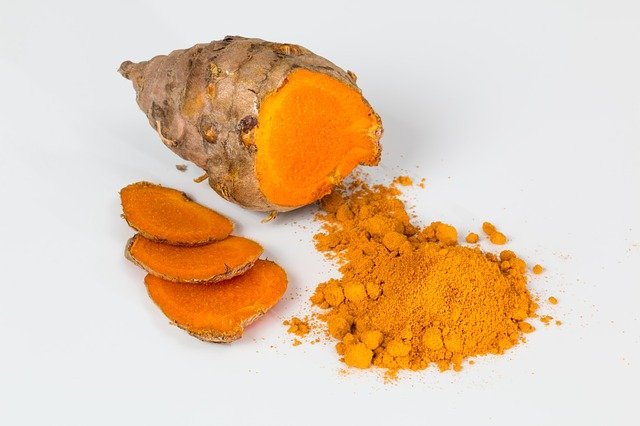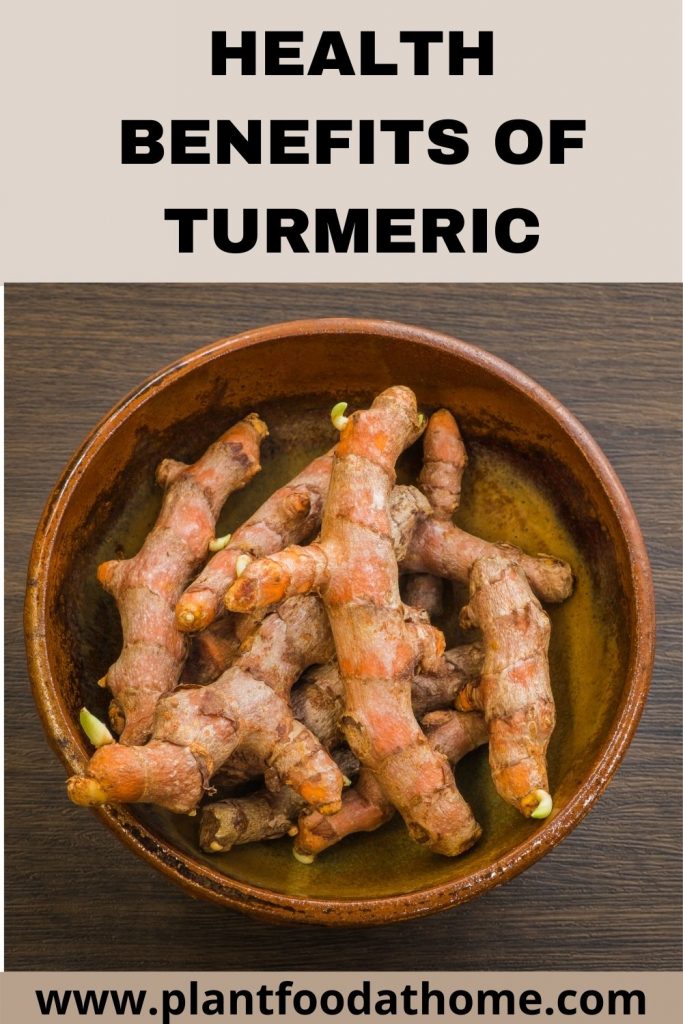Looking for the medicinal benefits of turmeric? Wondering how turmeric can help with your health and wellbeing? Well, you’ve come to the right place. After growing turmeric in my garden, I decided to do some research into the health benefits of turmeric. Read on to find out more.
By the way, this is not intended as medical advice, though it may benefit you to know more about the healing properties of plants, in this case, turmeric. And if you are looking to grow your own turmeric, we have an article here: How to Grow Turmeric and Make Your Own Turmeric Powder.

Table of Contents
Turmeric Health Benefits
The whole turmeric plant is edible, including the tough stalks, but it is the rhizomes that contain the curcumin that has the main healing properties. Though in India the crushed leaves are used to aid digestion.
Turmerics active compound is curcumin. And it is curumin that has proven to be a powerful antioxidant as well as an anti-inflammatory.
There are many claims made about turmeric as a cure for or as helpful for a lot of conditions. Whilst it does have some great proven attributes, not all sources are reliable or the claims proven. Therefore, the advice we offer here is from WebMD and Nuffield Health.
According to WebMD, turmeric can help with the following conditions:
- Hay Fever
- Itching
- Depression
- High Cholesterol
- Fatty Liver
- Osteoarthritis
Nuffield Health advises that turmeric has the following attributes:
- Anti-inflammatory
- Powerful antioxidant
- Anti-cancer effects
- May help with skin conditions
- Might be a brain food
So let’s have a better look at the health benefits:
Hay Fever
Taking turmeric, curcumin reduces the hay fever symptoms of sneezing, itching, runny nose, and congestion for many people.
Itching
As well as the itching that can occur as a reaction, taking turmeric three times a day for eight weeks reduces itching in people who have long-term kidney disease according to research.
Depression
There is research that shows people already being treated for depression with antidepressant drugs have reduced depression when taking turmerics curcumin as well.
High Cholesterol
Plus other fats in the blood such as lipids may be reduced by taking turmeric. There is evidence that blood fats triglycerides are reduced by taking turmeric, but tests are yet to prove the effects on cholesterol and lipids completely.
Fatty Liver
For those who suffer from NAFLD, which is non-alcoholic, fatty liver disease have reduced liver injury markers when taking turmeric.
Osteoarthritis
Many people find that taking turmeric extracts ease the symptoms and pain associated with osteoarthritis, sometimes with other herbal products. However, WebMD says that diclofenac generally works better.
WebMD advises that despite claims otherwise, turmeric is likely ineffective for treating stomach ulcers, skin damage caused by radiation therapy and Alzheimer disease.
The Nuffield List:
Anti-inflammatory
There have been studies that show positive effects on people suffering from conditions such as rheumatoid arthritis and inflammatory bowel disease of taking turmerics curcumin.
Powerful Antioxidant
Probably the reason a lot of us take turmeric or use it in cooking is that curcumin is a robust oxygen-free radicals scavenger; which helps prevent and manage heart disease. They also advise that the antioxidants in turmeric might reduce the risk of eye problems glaucoma, macular degeneration and cataracts.
Anti-Cancer Effects
Based on animal studies, turmeric might affect cancer formation, growth and development.
May Help with Skin Conditions
There is a study that turmeric can help reduce the symptoms of psoriasis and eczema.
Turmeric Might be a Brain Food
Nuffield says:
‘There is growing evidence that curcumin can cross the blood-brain barrier and may help to protect against Alzheimer’s disease. It works to reduce inflammation as well as the build-up of protein plaques in the brain that are characteristic of Alzheimer’s disease sufferers.’
– Nuffield
However, it is worth mentioning here that it is not wise to take turmeric if you have any of the following without first consulting a doctor:
- Gallstones
- Bile duct obstruction
- If you are taking warfarin or other blood-clotting drugs
In Summary
So whether you are interested in turmeric as a superfood or as a complementary medicinal plant, there appear to be many associated health benefits of turmeric.
Some of My Favorite Kitchen Items:
Further reading:
- Can You Eat Radish Greens? (And How to Eat Them)
- Lychee Fruit: What is a Lychee and How to Eat One
- Pomelo Fruit: What is a Pomelo and How to Eat One
- Are Carrots a Fruit or a Vegetable? Answered!
- Why Is My Garlic Bitter? Answered!

